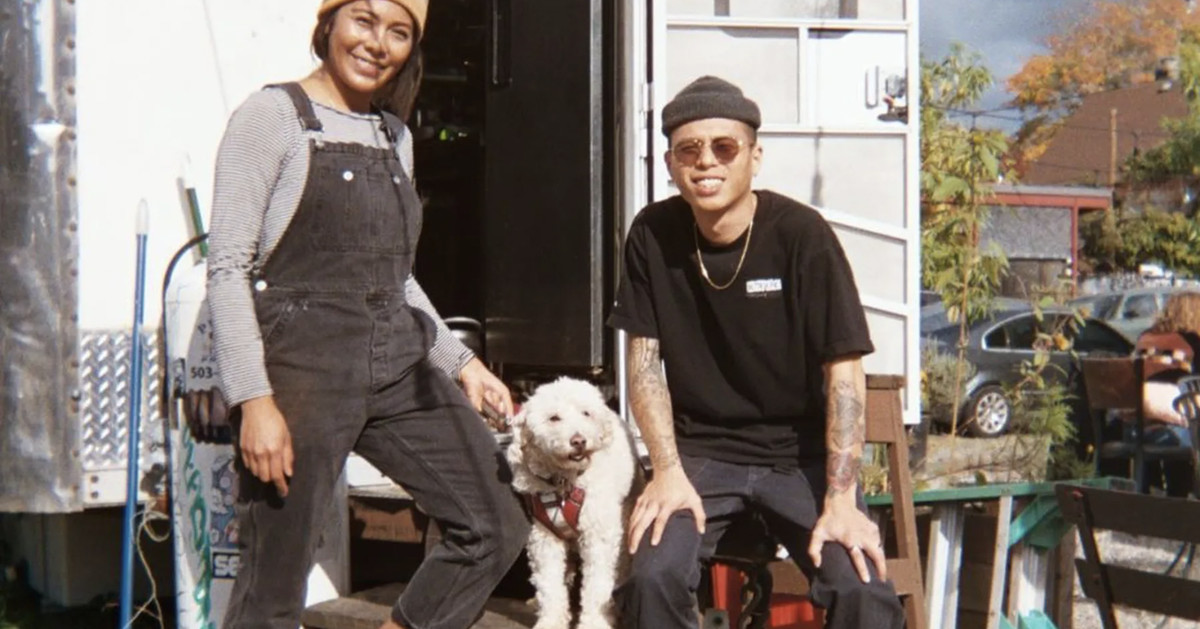Wood-fired food like shio koji pork chops and Collin Mohr’s grandma’s rolls are the backbone of the menu at Southeast Portland food cart Ruthie’s. Built right inside of the 105-square foot space, the oven is the heart of the cart. It burns at 700 to 800 degrees Fahrenheit, making the cart reach temperatures of 120 to 130 degrees on a normal day. When last week’s heat wave struck, co-owners Mohr and Aaron Kiss closed their cart for a week, popping up with a sandwich menu for two days at neighboring bar Cat’s Paw instead.
Ruthie’s wasn’t the only cart to hide out somewhere cool during the heat wave: The staff of Bing Mi, Northwest Portland’s popular jianbing cart, squeezed into owner Jacky Ren’s other business, a dumpling and noodle bar down the street. And those that didn’t have an air-conditioned restaurant space to inhabit ended up trying other workarounds to avoid the heat, be it altered hours or heat wave menus.
While in past years food carts have closed for triple-digit temperatures, that option has become harder for cart owners around the city. This year, Portland broke a record for the most consecutive days of 95 degree heat, and we’re heading into another weekend with temperatures expected to exceed 100 degrees. With heat waves in the Pacific Northwest increasing in frequency and severity, food carts are being forced to find different ways to handle service or lose out on revenue.
After a brutal summer last year, Richard and Sophia Le — the owners of Vietnamese food cart Matta — implemented a plan to avoid the heat, both in the short- and long-term. Last year, the cart was mainly staffed by the couple, but now that the Les are responsible for more staff, they didn’t feel comfortable having them come into work. Instead, Matta began popping up at Wayfinder Beer on Mondays, giving its staff a reprieve from cooking in a hot cart.
In addition to getting out of the food cart, taking over Wayfinder’s kitchen also gives the staff the opportunity to work a line as a whole team, which isn’t feasible in their confined space. Richard Le sees it as a trial run for the ultimate goal — opening a permanent restaurant. Opening a restaurant has long been the finish line for many cart owners in the Portland area, but with extreme temperatures becoming a more frequent concern — both in the winter and the summer — the stakes are far higher. The Les’s original plan was to keep the cart and use it for a different concept, but now they’re skeptical about its practicality.
“The way things have been going lately, it seems more responsible as a business owner to bring everyone to the restaurant and just sell the cart,” Richard Le says “The cart has been glorious in terms of how much growth we’ve gotten from it. Ultimately, I feel like for the safety of everybody long term-wise, it feels like the right move.”
Although Matta has the flexibility of switching up their hours — Richard Le credits the community with continuing to show up when the restaurant has to make changes — another survival strategy has been doing more events this year, which are static commitments. They served burgers this past Sunday at the Chinatown block party, which he describes as “not the most comfortable situation, but definitely better than being in a hot box.”
Similarly, Indian ice cream shop Kulfi is navigating how to handle their calendar of summer events. In 2019, Kiran Cheema and Gagan Aulakh started selling their popsicles out of a cart, specializing in events like farmers markets and outdoor fairs; the two opened an Alberta shop in April. Last year, they were entirely reliant on outdoor events in the summer, but having a shop of their own has given them a financial cushion. “Before, we were so reliant on these outdoor events in the summertime,” Cheema says. “The fact that we had the store open in time this year really helped us.”
Climate change delivered a one-two punch to the business this year: The long spring season put a damper on the number of markets they usually do, and when summer weather arrived swiftly and intensely, the couple then had to worry about events getting canceled due to the heat. In the middle of last month’s heat wave, Last Thursday, one of their scheduled events, was canceled, but the blow to Kulfi was less severe than it could have been.
“If things got canceled a year ago when we didn’t have a spot, that’s a whole week of income,” Cheema says. “Now that we have the shop, our income will still be lower because we didn’t get to the markets and those sales. It’s not so big of a deal like, ‘Now we can’t come back from this.’ … Summer doesn’t last that long.”

